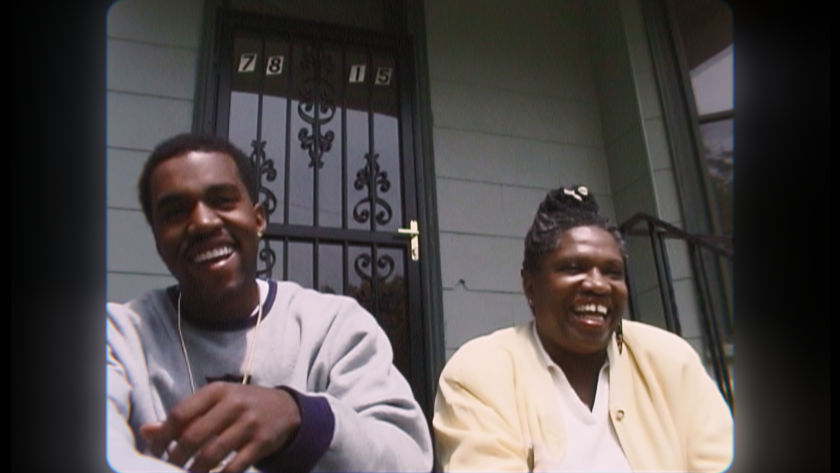Shared from www.latimes.com
Kanye West wasn’t always infamous. Before he threatened Pete Davidson, ran for president, married into the Kardashian dynasty, cut into Taylor Swift’s speech or called George W. Bush a racist, he was an aspiring producer and rapper in 1990s Chicago with boundless talent and potential.
Netflix’s intimate and often heartbreaking docuseries “Jeen-Yuhs: A Kanye Trilogy” chronicles the impressive rise and later stumbles of West, piecing together more than 21 years’ worth of footage shot by the artist’s friends and documentarians, co-directors Clarence “Coodie” Simmons and Chike Ozah. The four-hour-plus docuseries, which will be released in three parts over the next three weeks, with the first act, “Vision,” released Wednesday, is not a polished Kanye spectacle. Coodie & Chike, as they’re credited, have said that West was in the loop during the production process, but this is not a Ye-approved final cut. Which is precisely why it’s worth watching.
This fly-on-the-wall series is quiet and understated in comparison to its subject, applying the intimacy of a home movie to the evolution of West’s music virtuosity, his outsized sense of self, his perpetual need to achieve more and his mental health struggles. Narrator Simmons started filming West when the beatmaker was 21 because “he saw potential” and hoped to make a “Hoop Dreams”-style documentary.
Newsletter
The complete guide to home viewing
Get Screen Gab for weekly recommendations, analysis, interviews and irreverent discussion of the TV and streaming movies everyone’s talking about.
You may occasionally receive promotional content from the Los Angeles Times.
“Jeen-Yuhs” is not that, but it is a raw, candid and empathetic look at the man behind the platinum albums, public meltdowns and tabloid frenzy. Simmons defends his friend throughout, even when West at the height of his celebrity neglects the filmmaker, but he also reveals the performer’s battles behind the scenes as West loses his way following the death of his mother, Donda, in 2007.
The rapper’s relationship with his mom is central to the docuseries. She’s often shown by his side, lifting his spirits while keeping him grounded. They’re in her apartment and West’s career is just taking off when she advises him: “You’ve got a lot of confidence and you come off a little arrogant even though you’re humble.” He is silent, taking in every word. “But it’d be important to remember to stand on the ground,” she continues. “That way you can be in the air at the same time. That’s what I think it means when they say a giant may look in the mirror and see nothing, but everyone else sees the giant.”

Kanye ‘Ye’ West and Donda West in “Jeen-Yuhs: A Kanye Trilogy.”
(Netflix)
Act I is also a who’s-who of late-‘90s hip-hop, behind the scenes — Common, Rhymefest, Jermaine Dupri, Mase, Talib Kweli, Mos Def, Damon Dash, Memphis Bleek, Jay-Z. West is increasingly in their orbit as he becomes a sought-after producer. The studio scenes are rife with smoke, flip phones, cassette tapes, Snapple bottles and Kanye’s mouth retainer, which he pops out every time he raps over a track.
“Act II: Awakening,” which premieres Feb. 23, looks at West’s trajectory in the 2000s from top-tier producer to iconoclastic, genre-bending rap artist, one who would become a leading figure in the pop world. His creative vision was finally being celebrated, but all the attention meant he was losing his footing, especially after his mother’s passing. In “Act III: Awakening,” Simmons documents his concerns that his estranged friend is suffering from mental health issues and confirms his fears when they reunite on a trip to China to work on West’s fashion line. The footage of West discussing his addiction to Percocet and his bouts with bipolar episodes is achingly honest.
In many ways, the series is an attempt to reconcile the Kanye of those meteoric early years with the outlandish figure of later news reports: Kanye in a MAGA hat hugging Donald Trump; a TMZ interview in which the rapper proclaimed that 400 years of slavery “sounds like choice”; West’s bid for the presidency.
“It was difficult watching Kanye on TV knowing he had issues with his mental health. They were calling him crazy, but to me, it seemed like he was crying out for help,” Simmons narrates, noting that, while West had always rubbed some folks the wrong way, “for the first time it felt like he really lost the people.” Still, he and Ozah stuck with Kanye through bad and good. “Jeen-Yuhs” is a compassionate record of the journey.
‘jeen-yuhs: A Kanye Trilogy’
Where: Netflix
When: Any time, Act 2 starting Wed., Feb. 23
Rating: TV-MA (may be unsuitable for children under the age of 17)
Images and Article from www.latimes.com
